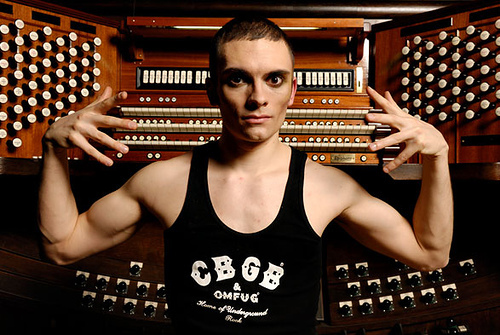Cameron Carpenter does not mean to be indelicate. Sometimes, he can’t help himself.
Carpenter, the maverick organist known for both his skills and his showmanship, feels grateful that the Friends of the Kotzschmar Organ invited him back for another go-round on Portland’s famous organ.
He just hopes the nonprofit organization that looks out for the best interests of the municipal organ looks ahead as well as it looks backward.
“They are promoting something that is 100 years old now. It’s just not that interesting,” Cameron said by phone as a cab whisked him through Manhattan. “They need to rebrand. They are memorializing someone who died in 1908, and the name is unpronounceable.”
Cameron has some ideas, if the Kotzschmar friends care to ask. “They have naming rights. They should use them,” he said, suggesting the Kotzschmar could cash in by aligning itself with a popular corporate brand.
Carpenter will be back in Portland for a concert at 7:30 p.m. Saturday at Merrill Auditorium, home of the venerable old Kotzschmar.
It’s important to say right up front that Carpenter loves the Kotzschmar. He would not come back to Portland to perform if he did not. Saturday’s performance will mark his fourth on the organ since 2003.
He just happens to believe that the Kotzschmar represents something that is dreadfully dated and has no chance at drawing a new audience. The problem is not unique to the Kotzschmar, which was given to the city 99 years ago by publisher Cyrus Curtis and named in honor of a popular music educator.
“All those things are built on the 19th-century idea that audiences come to music. In reality, audiences do not come to the music. Music ought to come to the audience,” said Carpenter, 30.
That is especially challenging when it comes to organ music. Organs, particularly big pipe organs like the Kotschmar, are not portable. It’s hard enough traveling with a grand piano; it’s next to impossible to travel with a decent pipe organ. It’s not going anywhere, and its inflexibility means the musical experience is defined first and foremost by the instrument itself.
Carpenter, who lives in Germany and travels widely, is in the process of getting around that roadblock by participating in the construction of two identical digital touring organs. One will be in Berlin, the other in Boston.
“It will be the same organ, same design, same everything,” he said. “They will talk to each other online. Whatever I do at the studio in Berlin propagates to the Boston organ, and vice versa.”
He’s been testing various digital organs for many years, “and most of them are junk. The digital organ has a poor reputation for a reason. A very small percentage of digital organs, and I mean really small, are any good at all.”
Carpenter hopes that his digital organ will be available sometime in 2012. In the meantime, he is performing all over the world. In late March, he accepted an invitation from conductor Michael Tilson Thomas and participated in YouTube Symphony Orchestra performance from Australia. He was among a handful of soloists brought in for the event.
The orchestra was selected by YouTube auditions, and members flocked to Australia from all over the world. That event is a good example how music can be portable and flexible, Carpenter said.
Yes, the music originated in a central location from Australia, but auditions were conducted globally utilizing technology, and the concert itself was broadcast live March 20 from Sydney and rebroadcast on YouTube throughout the day with each time zone, and is available for viewing online.
He hopes organizations like the Friends of the Kotzschmar Organ can utilize technology and unbutton their collars just a bit.
“The Kotzschmar represents a tradition in America that is almost gone, and I don’t want to say anything that will throw any water on the Kotzschmar Organ. They are good enough to have me back, and the Kotzschmar is one of the better equipped pipe organs in the United States,” he said.
“It is my hope that the programmers and the powers that be that present the organ to the public will continue to update their methodology and continue to move their programming and audience into the 21st century, through an emphasis on artists and music instead of an instrument. Anytime you are promoting an instrument, you are moving into the past.”
Staff Writer Bob Keyes can be contacted at 791-6457 or at:
bkeyes@pressherald.com
Follow him on Twitter at:
twitter.com/pphbkeyes
Send questions/comments to the editors.



